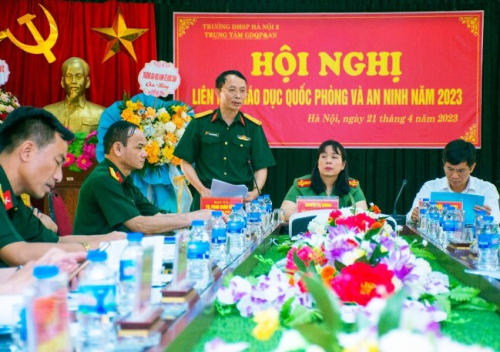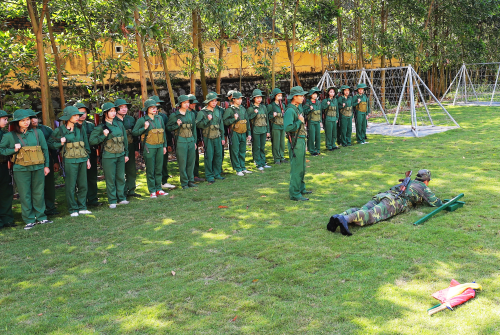Hanoi Pedagogical University 2 undergoes reforms to enhance the quality of national defence and security education
In recent years, alongside the training and development of teaching staff and educational administrators, Hanoi Pedagogical University 2 (HPU2) has focused on the task of organising national defence and security education for students of various colleges and universities, following Joint Circular No. 123/2015/TTLT-BQP-BGDĐT-BLĐTBXH dated 05 November 2015, issued by the Ministry of National Defence, Ministry of Education and Training, and Ministry of Labour - Invalids and Social Affairs and Decision No. 2861/QD-BQP dated 24 August 2021, by the Ministry of National Defence regarding adjustments and additions to the list of national defence and security education affiliations. To effectively carry out this important task, comprehensively promote the significant role and position of this subject, and strengthen the leadership, guidance, management, and operation of related activities, the Party Committee and Board of Directors of the University have enhanced the organisation and assigned the National Defence and Security Education Centre (under the university) to carry out the task of teaching the national defence and security subject for students, as well as training teachers and lecturers for national defence and security education. This is one of the innovative organisational models for national defence and security education, and in practice, the Centre has played a crucial role in fulfilling the assigned task, achieving many positive results.
 |
| Leader of the Centre speaks at the conference reviewing the collaboration in defence and security education in 2023 |
However, in the face of new developments in the task of defending the Motherland, socio-economic challenges, and the subversive acts of hostile forces, the requirements and demands for the work of national defence and security education in general and the educational work of the Centre and the University in particular become increasingly high. Meanwhile, in carrying out its main task, despite some fundamental advantages, the Centre has encountered numerous difficulties and challenges, particularly the uneven qualifications and the manpower shortage of the teaching staff. Also, the inadequacy of the teaching infrastructure and equipment causes many difficulties in keeping up with the expanding requirements of the subject. In addition, some affiliated institutions have not fully complied with the regulations on national defence and security education. Clearly identifying these advantages, challenges, and difficulties is crucial to successfully implementing the policy of fundamentally and comprehensively reforming the work education and training in accordance with the spirit of Resolution No. 29-NQ/TW dated 04 November 2013, of the Party Central Committee (11th Tenure). To continue building and affirming its credibility and position as a reliable institution in teacher training and defence and security education, the Centre is actively focusing on enhancing the quality of this work through a range of comprehensive, practical, and effective measures.
First and foremost, there is an emphasis on thoroughly grasping directives and legal documents related to national defence and security education, with a focus on Directive No. 12-CT/TW dated 03 May 2007 by the Politburo (10th Tenure) on “Enhancing the Party’s leadership in national defence and security education in the new situation;” the Law on National Defence and Security Education, various government decrees, Joint Circular No. 123/2015/TTLT-BQP-BGDĐT-BLĐTBXH, Decision No. 2861/QD-BQP of the Ministry of National Defence, as well as guidelines for implementing the National Defence and Security Education tasks for the academic year of 2022-2023 from the Ministry of Education and Training. Additionally, plans and instructions from the Central Council for National Defence and Security Education and the Hanoi City’s related administrative bodies are taken into account. Through this, the Centre leadership aims to ensure that the teaching and administrative staff and support personnel clearly understand the role, significance, requirements, and objectives of the work of national defence and security education for students. This approach is intended to elevate responsibility and foster motivation, determination, commitment to the fulfilment of the assigned tasks.
To meet the immediate and long-term requirements and tasks, the Centre focuses on building and developing a team of cadres and lecturers with sufficient quantity and quality. Currently, the Centre’s teaching staff and cadre corps are still insufficient, and it is expected to face further shortages in the coming years due to the retirements and transfers of some cadres and lecturers while the addition of seconded officers from the Military is no longer available. To address this challenge, the Centre’s Board of Directors has consulted with the Party Committee and the Board of Directors of the University, as well as relevant agencies with policies to prioritise the recruitment of students majoring in national defence and security education who graduate with distinction. The Centre aims to recruit approximately 5-6 new lecturers each year, with the goal of hiring around 18 new lecturers by 2028 to fill in the positions previously held by seconded officers from the Military. In the short term, the Centre plans to effectively reorganise and utilise the existing teaching staff and cadre corps. This involves assigning lecturers to both teaching and administrative duties, as well as inviting guest lecturers. For the long term, the Centre proposes that the University collaborate with educational institutions to advise the Ministry of Education and Training and the Ministry of National Defence to seek approval from the Government to develop plans to send lecturers who were formerly students majored in national defence and security education to reserve officer training courses to gain practical experiences and military skills, thus building a comprehensive and high-quality teaching staff for the subject. These graduates would also be registered in the reserve officer system, ready to supplement the regular forces of the Military. To quickly standardise the teaching staff and the cadre corps in terms of professional qualifications and teaching methods, the Centre diversifies training forms and focuses on cultivating and developing a team of young lecturers. In recent years, the Centre has actively balanced its workforce and make recommendation for the University to send many officers and lecturers to postgraduate courses and participate in training workshops organised by the Department of National Defence and Security Education (Ministry of Education and Training) and the Hanoi Capital Command. Simultaneously, the Centre strengthens on-site training for 100% of its cadres and lecturers to update knowledge and enhance teaching methods and skills. Additionally, it maintains a strict regime of exchanging teaching methods, reviewing teaching sessions, and organising contests for capable lecturers and cadres at all levels. Also, the Centre encourages and provides opportunities for cadres and lecturers to engage in scientific research and self-learning to enhance their professional competence and pedagogical skills.
 |
| Instructing infantry manoeuvering drills for students |
In conjunction with the development of the teaching staff and the cadre corps, the Centre actively updates teaching content, promotes innovative teaching methods, and evaluates learning outcomes. In practice, Circular No. 05/TT-BGDĐT dated 18 March 2020, issued by the Ministry of Education and Training on the Programme on National Defence and Security Education in pedagogical colleges and universities, and tertiary training institutions has been implemented for nearly three years. However, there is still no dedicated curriculum system for the subject. To address this issue, the Centre directs the Training Department and faculties to closely study teaching programmes and modules to compile and develop teaching materials. Subsequently, cadres from other centres, scientists, and leading professionals are invited to contribute, critique, refine, and apply the materials in teaching activities. During the compilation process, the Centre places emphasis on updating new contents related to the Party’s principles and the State’s laws on defence and security in alignment with the specialised training of students in affiliated institutions. It also incorporates new issues on global and regional situations and the mission of safeguarding the Homeland. Given the specialised nature of the national defence and security education subject, the Centre directs its lecturers to actively innovate teaching methods in alignment with the content of each module, topic, and the target student groups. Also, there is an emphasis on integrating information technology and modern tools into teaching. In recent times, the Centre directed faculties to develop electronic lesson plans, organise model teaching sessions, record lectures, and organise lesson presentations for students to preview during evening meetings. This approach allows students to gain initial insights into the content being taught and trained.
During the teaching process of the subject, the Centre requires its teaching staff to enhance interaction and exchange ideas, encourage students to tap into their self-learning and research spirit and provide guidance for them to apply theoretical knowledge in practical situations. Lecturers also incorporate documentary films with audio-visual illustrations depicting combat scenarios, movement techniques, tactics, and various military, defence, and security activities to captivate and engage learners. Additionally, the Centre invests in improving infrastructure, establishing training grounds and sports fields, updating teaching models and equipment and designing portable obstacles to adapt to different terrains, providing training opportunities at various locations within the training ground. Furthermore, students, especially those undergoing teacher training in national defence and security education, are assigned to participate in managing their trainees, guiding them in practical exercises and lesson reviews. Besides, to ensure a prompt and accurate assessment of the learning outcome, the Centre has developed a bank of multiple-choice theory test questions and invested in equipment such as scanning machines that use grading software, similar to the national high school graduation examination, to eliminate errors and ensure accuracy in the evaluation process.
The Centre consistently prioritises strengthening coordination with affiliated institutions and relevant authorities in organising national defence and security education for students. Annually, the Centre proactively organises partnership conferences on national defence and security education to grasp and update new strategies and policies from relevant authorities. These conferences also provide a platform to gather feedback from affiliated institutions, enabling the Centre to draw lessons for teaching, management, and creating a disciplined and serious learning environment. In addition, the emphasis is placed on integrating academic study with military discipline, maintaining daily and weekly regimes in accordance with military regulations.
Simultaneously, the Centre aligns its plans for national defence and security education for students with those of affiliated institutions and collects students’ feedbacks after their training at the Centre. Based on these feedbacks, the Centre develops plans for academic years, clearly define schedules for each institution, and sends out these plans and details to those institutions to ensure students are informed about the regulations and guidelines before they take part in training at the Centre. Throughout training period, the Centre regularly communicates with affiliated institutions about students’ academic and training results to collaboratively address any challenges or issues that may arise and organise extracurricular activities, such as long-distance marches, visits to military units in the local area, cultural and artistic festivals, and sports events to strengthen military knowledge, instill a sense of national pride, and foster a friendly and disciplined learning atmosphere for students.
With the resolute implementation and coordinated deployment of the above solutions, the Centre for National Defence and Security Education of Hanoi Pedagogical University 2 has successfully completed all the assigned tasks. In the academic year 2022-2023, the Centre organised national defence and security education, issuing certificates to over 19,300 students, of which more than 93.5% achieved commendable and excellent results. This accomplishment has been acknowledged and highly praised by the relevant authorities of the Ministry of Education and Training, the Ministry of National Defence, and affiliated institutions, affirming its reputation in national defence and security education for students, contributing to the cause of building and defending the Motherland.
Senior Colonel, Dr. PHAN XUAN DUNG, Deputy Director of the Centre for National Defence and Security Education of HPU2